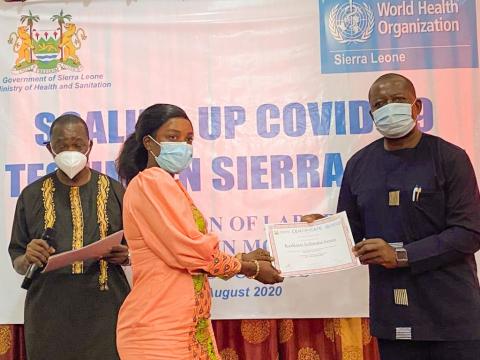By Mabinty M. Kamara
The Ministry of Health and Sanitation (MoHS), with support from the World Health Organization (WHO), is set to increase its testing capacity of the Coronavirus Disease from about 500 to 1,000 daily, with the training of 30 scientists as laboratory technicians.
The trainees were presented with certificates last week after completing two weeks intensive theoretical training.
Inadequate human resource in laboratories, according to officials, have been a contributing factor to the delay in turnaround time of test results in the country.
Professor Sahr Gevao of the National Covid-19 Emergency Response Center (NaCOVERC), explained that with the emergence of COVID-19 in China in December, having noticed the gap in personnel, they decided to train 15 scientists in specialization in Molecular diagnostics. He said when the virus finally arrived in the country, those 15 scientists formed the bedrock of the diagnosis of COVID-19 without international help.
Professor Gevao said as they moved on, they realized the need to increase the testing capacity. For this reason, he noted, the WHO supported the training of 30 Sierra Leonean laboratory scientists in Molecular diagnostics to help improve the turnaround time and the testing capacity.
“We were only testing about 400 to 450 samples a day from the five laboratories we now have. It became apparent that we needed to train more, but I did not have a clue about how to go about it, and suddenly, a savior appeared in the name of Dr. Evans [Liyosi], the WHO country representative. He called me to his office and told me ‘the only thing that we can do is to increase laboratory testing and I am here to assist you. I will provide the fund,’” Prof. Gevao explained. He added that at this point they moved to recruitment of trainees and subsequently went through the intensive two weeks training.
Doris Harding, chairperson of the ceremony marking the certification of the trainees, gave an over view of the training, in which she explained the important role of laboratories in responding to viral outbreaks. She said there were only four fully functional laboratories doing molecular diagnosis in the country at the time of the outbreak, and that they were also constrained in terms of human resource.
“Our key challenge at the time was human resource. Human resource was a challenge in public health labs. We equipped and activated labs that are necessary and trained personnel that could be rapidly deployed. This is the reason why you guys were selected to be trained, so that you can expand the testing at regional level,” she told the trainees.
Officials say the 30 trainees were selected in rigorous selection process out of 45 applicants.
“And for the long term, the lab scientists will be involved in the molecular surveillance of other epidemics and pandemic prone diseases such as Ebola virus, lassa fever virus, influenza virus, etcetera,” she emphasized.
The WHO country representative in Sierra Leone, Dr. Evans Majani Liyosi, noted that laboratory diagnostics are paramount in achieving an efficient surveillance system that allows for prevention, prompt detection, confirmation, response and recovery from epidemic or pandemic.
He added that there was a global move to encourage more laboratory testing, which is why they have invested in capacitating laboratories in Sierra Leone both in terms of human resource and equipment.
He therefore encouraged the trainees to be committed and diligent to the service to their nation and to humanity.
“WHO commits to pay incentives for the selected laboratory scientists for a period of six months, through the MoHS. WHO will further work with the MoHS and partners to ensure smooth transition,” he said.
He added: “WHO is committed to the continued support to the government, MoHS, COVID-19 Response Team, and collaborating with the various partners, in their efforts to contain the COVID-19 pandemic, and in their ultimate efforts to protect the public from negative effects of pandemic in the context of Universal Health Coverage.”
Public Health Emergency Director, Mohamed Vandi, who represented the Minister of Health at the certification ceremony, applauded the WHO and the pillar leads for the role played in the training of the scientists. He noted that surveillance and laboratory were intertwined as one cannot go without the other. He added that laboratory testing has been a challenge for many countries including the United States and the UK.
“In many countries, like the UK and the United States, up to date turnaround time in many states is more than one week. That is why we must give a big clap to the labs here. They have been doing a great job. Nevertheless, we need to improve,” he said.
Copyright © 2020 Politico Online








